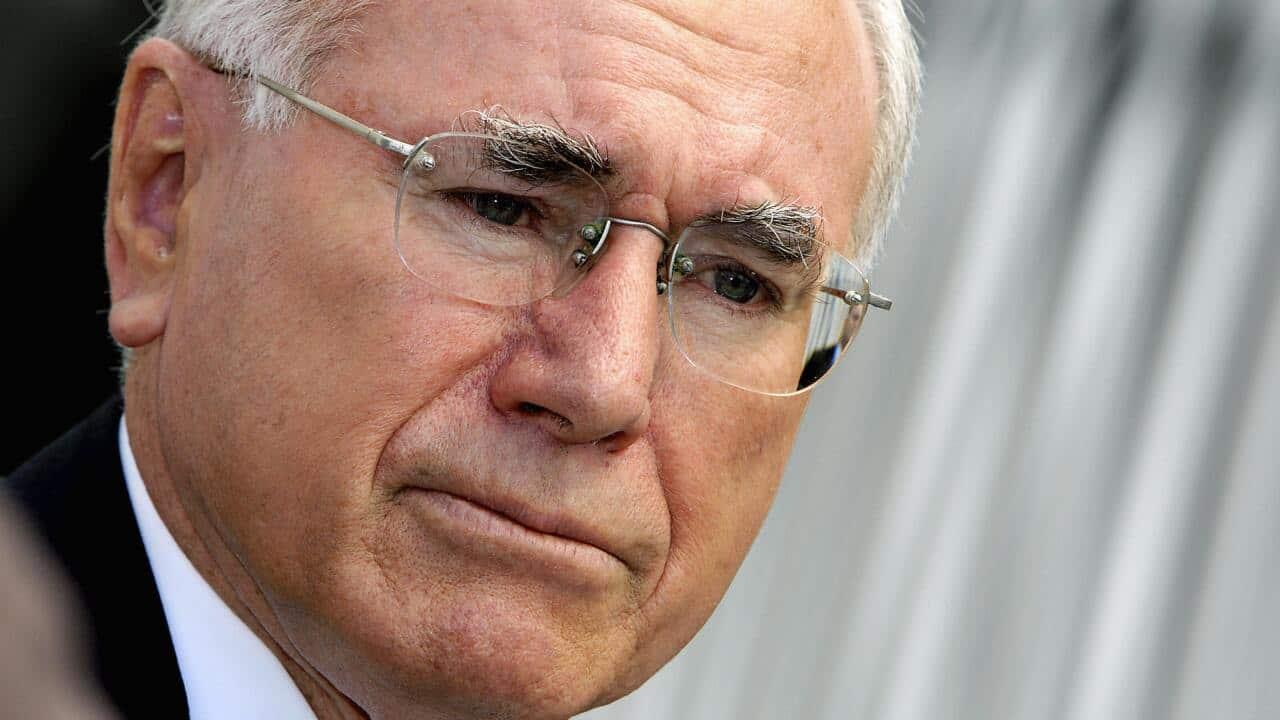As the Federal Election campaign enters its final weeks, few candidates would refuse a helping hand from a former Prime Minister. Jamie Briggs stood proudly as he introduced John Howard at the Strathalbyn Senior Citizens centre, in his safe seat of Mayo in the Adelaide Hills.
“It is a real honour to know him,” Mr Briggs said.
“Estee and I have had the pleasure of knowing Mr and Mrs Howard for a decade now.”
In turn, Mr Howard spoke warmly of Jamie Briggs and said he was happy to help his “mate” out, telling journalists and the senior citizens that Mr Briggs was his former staffer who always gave him frank advice, even if he didn't like it.
"The last thing you want is a yes man, he was an independent thinker," Mr Howard said.
They both denied it, but Mr Briggs indeed needs some help holding onto his seat. This was the second high profile visit in a week after Prime Minister Malcolm Turnbull also held a very colourful street walk with the member for Mayo, announcing money for a local sporting oval.
Mayo is an electorate that would not usually garner this much attention. It's blue ribbon liberal territory, the seat of former Howard foreign minister Alexander Downer, taking in the picturesque Adelaide Hills with its wine makers and tree changers.
There are a few issues at play, including some antipathy towards Mr Briggs in the electorate, after he resigned from the ministry over summer because of a complaint about his behaviour in a Hong Kong bar.
Keen to test the sentiment, I approached several voters in the main street of Mt Barker.
Some of the things said about Mr Briggs are rather unprintable. To be fair, I hear similar things about most politicians and in fact journalists, but this was more personal.
Even so, Mr Briggs has a very healthy margin of 12.5 per cent, but the former prime minister said any smart, sensible candidate understod the need not to take his own seat for granted.
“It’s often in these safe seats that people can sneak up on you,” Mr Howard said.
He is of course referring to the Nick Xenophon Team candidate Rebekha Sharkie, who used to work for Mr Briggs and was a Liberal Party member, but now Mr Briggs' rival.
Mr Howard was asked to explain opinion polls pointing to a surge in support for independents and micro-parties this election.
"That's a phenomenon that's seen around the world, people aren't as rusted on as they used to be," Mr Howard said.
"That pre-dates Nick Xenophon, and has been manifested in the past, in 1998 with Pauline Hanson, and in other parts of the world with unpredictable results in Republican primaries that have produced Donald Trump.
"It's not just a Xenophon phenomenon, I don't think we should overestimate it."
Independents 'all things to all people'
Mr Howard also wrote off the chances of any Xenophon candidates making a lower house breakthrough, including in the seat of Mayo.
"He obviously has polled well in the past in the senate, but I don't believe he'll get any lower house seats," he said.
"Now, it's fine if you're an independent to be all things to all people, it's fine to say on the one hand this and on the other hand that.
"In the end, if the Xenophon party aspires to win seats in the lower house, they're aspiring to have some kind of balance-of-power situation. That means you've got to declare yourself, and in the end people have got to make a decision between Turnbull and Shorten."
Senator Xenophon tried not to take it personally.
"I really like John Howard, and it really saddens me that he is using that sort of mudslinging," he said.
"I thought that John Howard was much classier than that, to use mudslinging to compare me to Pauline Hanson.
Opinion polls consistently put the Xenophon vote in South Australia in the 20 per cent range and in Mayo Ms Sharkie is out-polling Labor.
Adelaide University politics professor, Clement Macintrye said if Ms Sharkie finished second, with a vote in the 20 per cent range, it was possible an upset would be caused.
"If the Liberal vote falls below 50 per cent and if the other candidates preference each other, then it's possible for a candidate to come from the mid 20s with the right flow of preferences to push through and win that seat," Professor Macintyre said.

